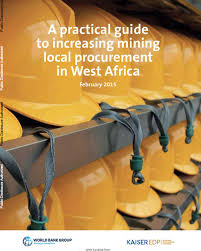The World Bank is a vital source of financial and technical assistance to developing countries around the world. We are not a bank in the ordinary sense but a unique partnership to reduce poverty and support development. The World Bank Group has two ambitious goals: End extreme poverty within a generation and boost shared prosperity.
- To end extreme poverty, the Bank's goal is to decrease the percentage of people living on less than $1.25 a day to no more than 3% by 2030.
- To promote shared prosperity, the goal is to promote income growth of the bottom 40% of the population in each country.
The World Bank Group comprises five institutions managed by their member countries.
The World Bank Group and Land: Working to protect the rights of existing land users and to help secure benefits for smallholder farmers
The World Bank (IBRD and IDA) interacts primarily with governments to increase agricultural productivity, strengthen land tenure policies and improve land governance. More than 90% of the World Bank’s agriculture portfolio focuses on the productivity and access to markets by small holder farmers. Ten percent of our projects focus on the governance of land tenure.
Similarly, investments by the International Finance Corporation (IFC), the World Bank Group’s private sector arm, including those in larger scale enterprises, overwhelmingly support smallholder farmers through improved access to finance, inputs and markets, and as direct suppliers. IFC invests in environmentally and socially sustainable private enterprises in all parts of the value chain (inputs such as irrigation and fertilizers, primary production, processing, transport and storage, traders, and risk management facilities including weather/crop insurance, warehouse financing, etc
For more information, visit the World Bank Group and land and food security (https://www.worldbank.org/en/topic/agriculture/brief/land-and-food-security1
Resources
Displaying 1041 - 1045 of 4907The Long and Winding Path to Private Financing and Regulation of Toll Roads
Road transport has long been the dominant form of transport for freight and passenger movement throughout the world. Because most road projects require investments with long amortization periods and because many projects do not generate enough demand to become self-financing through some type of user fee or toll, the road sector remains in the hands of the public sector to a much greater extent than other transport activities.
Vietnam : On the Road to Labor-Intensive Growth?
Since Vietnam's adoption of the doi moi or renovation policy in 1986, the country has been undergoing the transition from central planning to a socialist market-oriented economy. This has translated into strong economic growth, led by the industrial sector, which expanded more than 13 percent a year from 1993 to 1997. Vietnamese policymakers are concerned, however, that employment growth has lagged.
Urbanization without Growth : A Not-So-Uncommon Phenomenon
To find out why African countries' experience with urbanization and sustained growth appeared to differ from that of other countries, the authors investigated the determinants of urbanization across countries over 40 years. Rather than studying individuals' decisions to migrate, they relied on macroeconomic data and cross-country comparisons. A central hypothesis of their study: that individuals move (with varying degrees of ease) in response to economic incentives and opportunities. If location incentives are distorted, so is growth.
Sri Lanka - Reshaping Economic Geography : Connecting People to Prosperity
Economic progress is accompanied by a
fundamental spatial transformation where the economic
landscapes of countries become increasingly uneven. The
journey from low incomes to high incomes involves rising
concentration of prosperity in a few places. Connecting
people to prosperity - is the principle behind economic
integration policies that can help countries reap the
benefits of both uneven growth and inclusive development.
A practical guide to increasing mining local procurement in West Africa
This document provides information, guidance and tools to support decision-making, planning and implementation of mining local procurement, in particular at a country level. It can be used by individual role players as well as form the basis of consultative processes. The guide can also support regional harmonization relating to mining local procurement. Although based on West Africa, it will be a useful resource in other regions.







